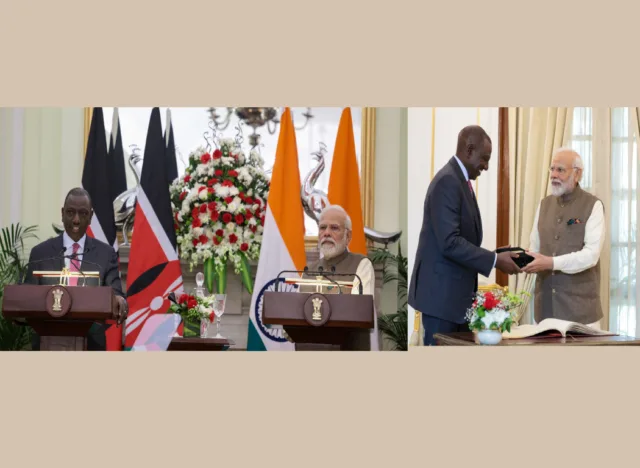India and Kenya, being the maritime neighbors, have a strong and multifaceted connection characterized by regular high-level visits, increased commerce and investment, and broad people-to-people ties.
Political Relations
In 1948, India created the post of Commissioner for British East Africa in Nairobi, and in 1963, it established an Assistant High Commission in Mombasa. Vice President Dr. S. Radhakrishnan, Prime Minister Indira Gandhi, and Presidents Morarji Desai, Neelam Sanjeeva Reddy, and Moi have all visited Kenya. PM Narendra Modi’s state visit to Kenya in 2016 strengthened bilateral ties, with both leaders signing deals on military, commerce, and development aid. India also sent a cutting-edge cancer therapy machine, a $1 million contribution for the renovation of the Mahatma Gandhi graduate library at the University of Nairobi, and the inaugural Festival of India in Kenya. President Uhuru Kenyatta visited India in +2017 when he attended the Vibrant Gujarat Summit and a business event in Delhi. The discussions centered on enhancing defence, maritime security, commerce and investment, and counterterrorism cooperation. During the visit, a MoU on agricultural and allied sector cooperation was signed.
Economic Relations
Kenya’s sixth-largest commercial partner and largest exporter to Kenya is India. Pharmaceuticals, steel, equipment, and vehicles are among the Indian exports to Kenya, while primary commodities such as soda ash, vegetables, and tea are among the Kenyan exports to India. Tata Group, Essar, Reliance Industries, and Bharti Airtel are among the Indian corporations with a strong presence in Kenya. Bank of Baroda and Bank of India are Indian public-sector banks with operations in Kenya. Aviation communication between the two nations is limited, with Kenya Airways flying from Mumbai and Delhi to Nairobi. Services to Nairobi, Air India’s second overseas destination, began in 1951 and were eventually discontinued by the airline in 2010. However, Air India has resumed flights between Mumbai and Nairobi starting in November 2019.
Bilateral Trade
In 1981, India and Kenya negotiated a trade agreement under which both nations granted each other Most Favored Nation status. As a follow-up to the agreement, the India-Kenya Joint Trade Committee (JTC) was established at the ministerial level in 1983. Since then, the JTC has convened ten times. The most recent 10th JTC took place virtually in September 2021. In 2014–15, India was Kenya’s greatest commercial partner, with bilateral commerce totaling US$ 4.235 billion. Petroleum goods, medicines, steel products, machinery, yarn, cars, and power transmission equipment are among the most important Indian exports to Kenya. Soda ash, vegetables, tea, leather, and metal waste are the most important Kenyan exports to India. The bilateral trade numbers are shown in the table below.
In 2019, the Mission hosted an India-Kenya Trade and Investment Forum, which was attended by two governors, the principal secretary of the Ministry of Trade, and more than 150 Kenyan and Indian businesspeople. The mission provided support for several exhibitions, buyer-seller meetings, and trade events, including ‘Namaskar Africa’ and others. Trade delegations from Tamil Nadu, Gujarat, and several export committees were accommodated by the mission. As a result of the mission’s endeavors, a MoU was signed between Narok County Government and SSPL, also known as Sri Sri Tattva, to promote Ayurveda and Ayurvedic practices. In May 2019, a digital video conference was arranged for discussion between the then CIM, Hon’ble Suresh Prabhu, and representatives of the Indian Diaspora business community.
India is Kenya’s second-largest investor, according to the Kenya Investment Authority (KenInvest). Over 60 large Indian corporations have made investments in a variety of industries, including manufacturing, real estate, pharmaceuticals, telecom, IT and ITES, banking, and agriculture. Thousands of direct Kenyan jobs have been created as a consequence of Indian investments. Indian pharmaceutical firms have a significant presence in Kenya. In 1989, a bilateral Double Taxation Avoidance Agreement (DTAA) was struck. The revised DTAA was signed in July 2016 and went into effect on August 30, 2017. The Federation of Indian Chambers of Commerce and Industry (FICCI) and the Kenya National Chamber of Commerce and Industry (KNCCI) formed the Joint Business Council (JBC) in 1985. FICCI and KNCCI renewed their agreement in January 2017 on the sidelines of the Business Forum during President Uhuru Kenyatta’s state visit. In January 2017 and August 2018, the revived JBC convened in New Delhi. The mission launched a conference of CEOs from over 40 Indian firms located in Kenya in February 2016, and the India Business Conference has had nine sessions since then.
Technical Cooperation
Under its Indian Technical and Economic Cooperation Programme, India awards 101 fully paid scholarships to Kenyans each year to educate them in technical skills. Kenya has received a $61 million loan from the Exim Bank of India to upgrade its national electricity system. The Pan-African e-Network initiative of India aims to provide tele-education and healthcare services to African countries, including Kenya.
Defence Cooperation
India and Kenya have agreed to increase marine security cooperation in the Indian Ocean area and to train counter-insurgency forces together. Defence Minister Rajnath Singh and Kenya’s Cabinet Secretary for Defence, Aden Bare Duale, met bilaterally in New Delhi in August this year. The discussions centered on boosting capability and cooperating in the defense sector and equipment. Goa Shipyard Limited and Kenya Shipyard Limited signed a Memorandum of Understanding for capacity enhancement and partnership in ship design and construction. India has also offered to help Kenya put up an advanced CT scan facility. The summit also emphasized India’s importance of engagement with African states, as well as the Indian defense industry’s expanding competence.
Conclusion
India and Kenya, both located in the Indian Ocean area, have a long history together, and Kenya has a sizable ethnic Indian community. Kenya’s agricultural economy benefits from India’s support in industries such as agriculture, manufacturing, and information technology. Kenya is an important location for bilateral engagement, and India- Kenya assists each other in fortifying its seafront by providing training, logistical assistance, and equipment.









